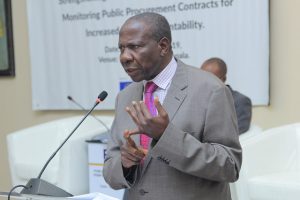Uganda’s economy is projected to enter a new growth phase when commercial oil and gas production begins in 2026, with the government eyeing double-digit growth rates for the first time in its history.
Speaking during the 2026/2027 National Budget Conference in Kampala, Finance Minister Matia Kasaija described the coming years as a turning point for the country’s economic transformation.
He said the economy is expected to grow by 7% in the 2025/26 financial year and maintain an average growth rate of at least 8% annually over the next five years.
However, the anticipated start of oil and gas production in 2026 is forecast to push growth into double digits, creating new opportunities for revenue, jobs, and investment.
“The Budget Strategy for FY 2026/27 prioritises investment in the first phase accelerator actions of the Tenfold Growth Strategy, anchored on four key growth areas underpinned by the goal of full monetisation and formalisation of the economy,” Kasaija said.
The government’s Tenfold Growth Strategy focuses on five objectives:
-
- increasing value addition in agriculture, minerals, oil and gas, and tourism,
-
- investing in science, technology and innovation,
-
- sustaining investment in enablers such as transport, electricity, industrial parks, education, health, and security,
-
- enhancing domestic revenue mobilisation, and
-
- promoting regional integration to improve market access.
Kasaija emphasised that achieving these targets will require significant resources, noting that Uganda will reprioritise funds within its fiscal framework, strengthen tax collection, and attract foreign direct investment.
Sound fiscal and monetary policies, he said, would also be critical to maintain macroeconomic stability and improve credit ratings.
The strategy further hinges on reducing the cost of doing business, improving governance, and accelerating Public-Private Partnership (PPP) projects to unlock large-scale infrastructure investments.
To expand funding options, the government plans to leverage institutions such as the Uganda Development Bank (UDB), Uganda Development Corporation (UDC), the Agricultural Credit Facility (ACF), the Small Business Recovery Fund (SBRF), and the Emyooga programme.
According to Kasaija, the oil and gas sector will not only generate revenues but also stimulate industries such as petrochemicals, construction, logistics, and services.
Analysts, however, caution that success will depend on the government’s ability to manage oil revenues transparently, maintain institutional discipline, and ensure that rapid growth translates into tangible benefits for ordinary Ugandans.
“Uganda is ready to seize the oil and gas opportunity, but it will take disciplined resource mobilisation, smart investments, and sustained reforms to deliver on the promise of shared prosperity,” Kasaija stressed.






















